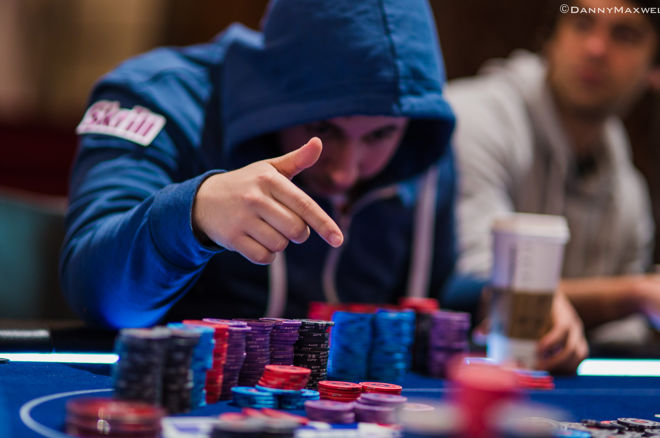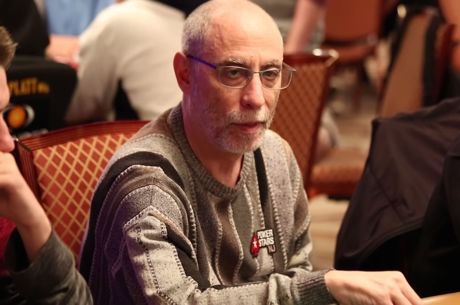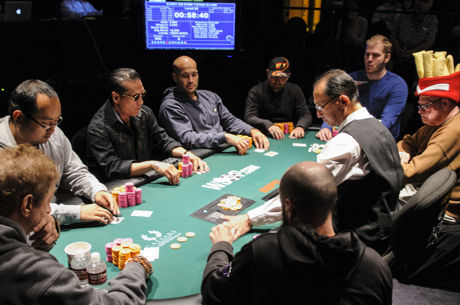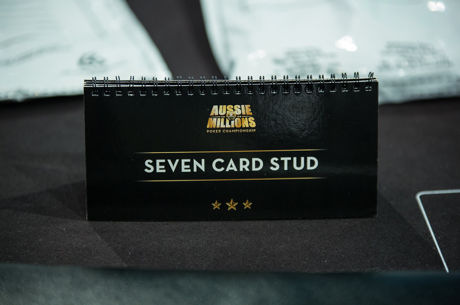Pulling the Trigger: Recognize When You Should Bet the River

I've noticed in my home game — especially when we're playing seven-card stud — many otherwise good players tend to make some rather costly mistakes on the very last round of betting, a.k.a. the river.
This is especially obvious in seven-card stud, but the lessons learned from such mistakes can be applied to all other games as well. Let's look at one such mistake and the "logic" that some thoughtful (though not expert) players use to justify the play. Then I'll unwind the situation and show you why a different path makes more sense, and in the process I hope you'll take away a couple of useful lessons for play on the river.
Some poker players like to give lessons at the table. My home game has a few who do. But sometimes the lessons, in addition to being unwelcome, are dead wrong.
The game was seven-card stud, with $10/$20 limits, and Eldritch had been betting his hand from the first round. With an ace showing he raised the bring-in on third street, then led the betting on fourth street when he caught a blank, bet again on fifth street when he caught a blank, and fired once more on sixth street when he paired his fifth street card. On the river, he showed the following:
(XxXx) A♥5♣3♠3♦ (Xx)
His opponent, Jimmy, had been playing his hand as if he were on a flush draw. He called along with a couple of other players on third street, then caught another of his suit on fourth and called again after someone else called Eldritch's raise. Jimmy called once more on fifth street at which point it became heads-up, then called on sixth street when he didn't catch another of his suit. On the river, here's what Jimmy showed:
(XxXx) 10♠4♠6♣8♥ (Xx)
Eldritch was first to act on the river with his ace, and when he bet $20, Jimmy folded. After he folded, Jimmy scolded Eldritch.
"You had no business betting the river," he began. "If I had caught, I just would have raised you. You would have been better off just checking because I'm either going to fold to your bet or raise you — your bet has no value. It could only cost you money."
This is standard thinking, I've found, among many good but not great stud players. When you have a good made hand like aces up (as Eldritch did) and are up against a drawing hand, they opine that it doesn't make sense to make that final bet, because their opponent is just going to fold if they miss, so the bettor won't make any money. But if their opponent catches they'll raise, then you'll have to call a second bet to make sure they're not bluffing. It's a net loss to the initial bettor, so they argue.
There's a certain logic to that. But it's dead wrong advice. Here's why.
The player with aces up (or other similarly strong hand) should bet the river into the drawing hand, because the odds his opponent caught and will raise are outweighed greatly by the chances he missed but will call anyway. There are other collateral reasons making the bet correct as well.
Assuming there has been a fairly even distribution of the suited cards that make the flush, it's a little worse than 4-to-1 against the drawing hand getting there on the river. Assuming Eldritch must call every time Jimmy catches his flush and raises, it will cost Eldritch a little less than 25% of a large bet to make this move (the one large bet he must call for the raise divided by a little more than four). But, as I think you'll agree, he will win far more than that when his opponent calls his bet.
"Wait," you may be saying. "Jimmy will never call if he doesn't hit his flush." But that's not so, as only a few moments of inspection will reveal.
While it's true that Jimmy would fold a busted flush draw — if that's all he had — there are many, many other possible hands he might have with which he would call.
First of all, it may only look like he was on a flush draw. Remember his final hand:
(XxXx) 10♠4♠6♣8♥ (Xx)
Sure, it looks like a flush draw with him calling all the way. But he might have had (J♠J♣) 10♠ to start. That would be a reasonable hand with which to be calling, especially with the jacks and tens completely live, or if Eldritch often raised with just the bare Aces — especially with other players in to build the pot even more.
Similarly, he might have had (A♦10♣) 10♠. He would have doubted that Eldritch had a pair of aces, but he wouldn't have had the stones to reraise, figuring instead he'd just call along. You can imagine a whole bunch of possible holdings on third street other than a naked flush draw.
Another possibility is that Jimmy did have a flush draw on third street but improved to something else as the hand progressed. There are many possibilities, and with all of them, a good player is going to call on the river because the pot is so big. Such a player does not want to make the huge mistake of folding and losing out on 10 or so big bets, as opposed to the relatively small mistake of calling and losing only one more big bet. By checking, for fear of the less than 4-to-1 flush draw having come in, the player with aces up is foregoing a profit in the long run.
There is one additional reason to bet on the river with your two pair. If you are known for always checking in this situation, you will be giving your observant opponents with good memories too much information. If you bet and they fold, they don't get to see your hand.
You might have been bluffing. You might not have had what they thought you had. You might have been mixing up your play. You should be reluctant to give away information for free, and checking down the river does exactly that.
Ashley Adams has been playing poker for 50 years and writing about it since 2000. He is the author of hundreds of articles and two books, Winning 7-Card Stud (Kensington 2003) and Winning No-Limit Hold'em (Lighthouse 2012). He is also the host of poker radio show House of Cards. See www.houseofcardsradio.com for broadcast times, stations, and podcasts.
Want to stay atop all the latest in the poker world? If so, make sure to get PokerNews updates on your social media outlets. Follow us on Twitter and find us on both Facebook and Google+!









